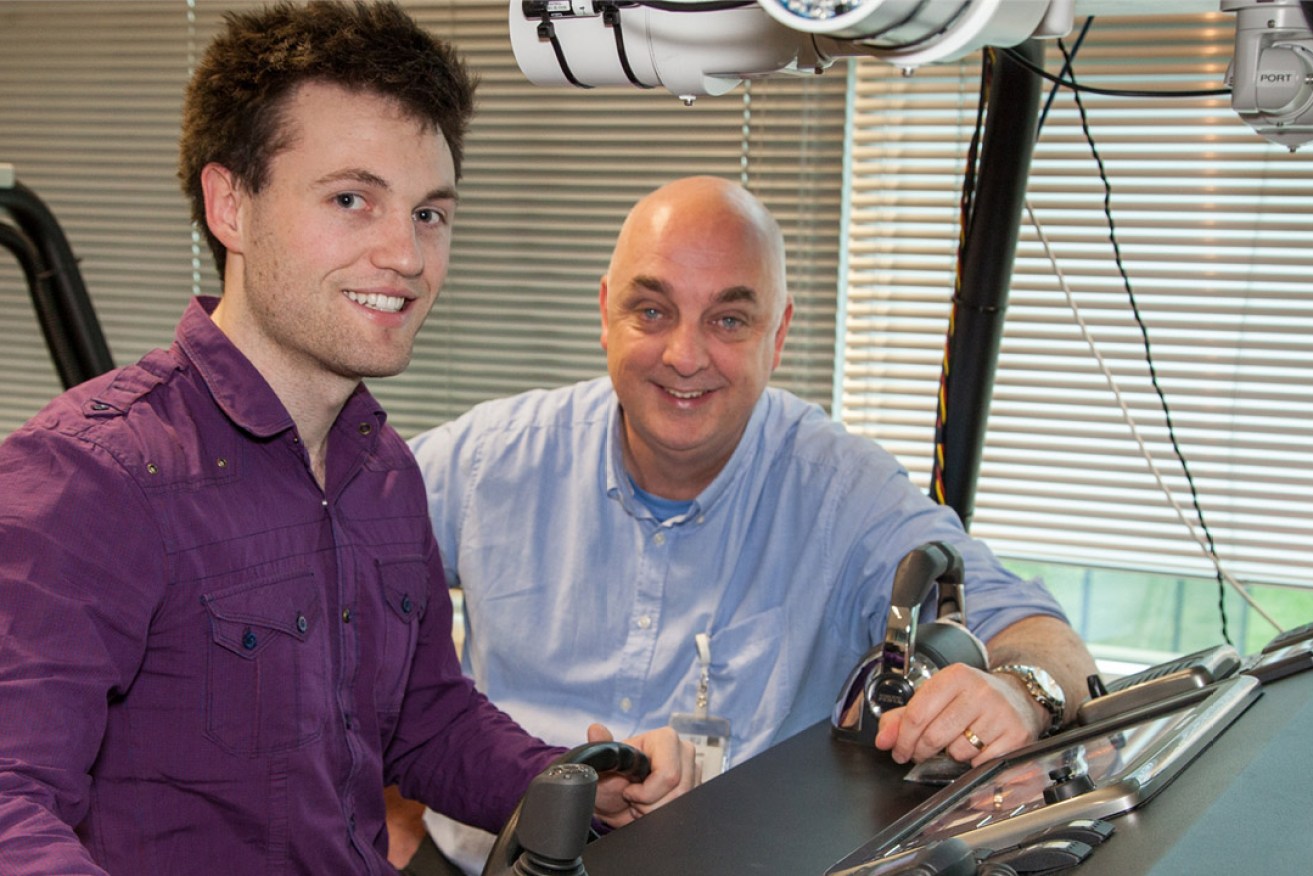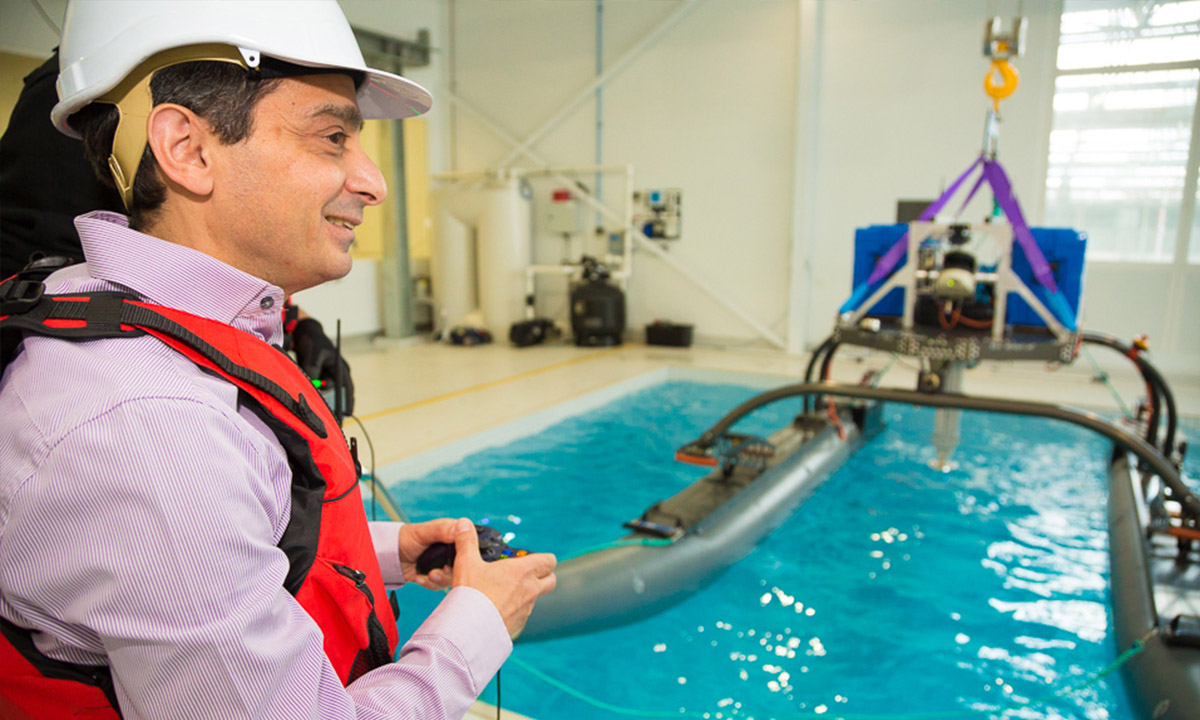Engineering jobs shape SA defence future
Flinders engineering student Luke Berry is playing a part in producing an Australian indigenous Unmanned Surface Vessel (USV) under a State Government industry scholarship program.

Flinders University intern Luke Perry with Dr Derek Rogers, Program Manager / Engineering Manager of Saab’s Maritime Systems Centre of Excellence in Autonomous Vessels at Mawson Lakes near Adelaide. Photo courtesy Ben Grant, Saab Australia
The third-year computer systems engineering student is working with global defence company Saab Australia under a State Government’s Defence and STEM (science, technology, engineering and mathematics) internship program.
The internship provides scholarship support to Luke for 20 weeks of experience at Saab’s global Centre of Excellence in Autonomous Vessels (CEAV) at Mawson Lakes.
The Saab CEAV team, led by Dr Derek Rogers, is working towards a major defence exercise to be held in Australia in November 2018, called Autonomous Warrior, an extension of the recent Royal Navy event Unmanned Warrior.
“USVs have applications in defence, civil security and other areas,” Dr Rogers says.
“The defence applications include mine counter-measures, anti-submarine warfare, rapid environmental assessment, ship protection and surveillance”
“We’ve worked closely with the Australian Defence Force, the Defence Science and Technology Group, Australian universities, suppliers and local manufacturers in our work so far,” he says, adding USVs are a good opportunity for Australian industry.
Luke is focusing on an important aspect of autonomy related to the safe navigation of the Australian-designed vessel.
“I am excited about doing my work placement in automation and believe that it will be a large role in the future over so many applications,” Luke says.
“It has the potential to save lives and reduce risk, especially in the defence sector.”
Luke says he is enjoying the “thrill of putting the difficult, theoretical work I’ve learned over the past few years apply to practical, real-world uses”.
Luke is the second student from Flinders University to work with Saab’s USV program under a Defence and STEM scholarship. Last year’s intern Scott Hutchinson has gone on to undertake his Honours year on the University’s own USV project.
Both students say their internships have given them incentive to join the USV project team based at the Flinders’ Centre of Maritime Engineering, Control and Imaging at Tonsley.
Associate Professor Karl Sammut, who heads the Centre of Maritime Engineering, Control and Imaging at Flinders’ Tonsley facility, says the internship program is giving undergraduates great momentum and industry insights.

Associate Professor Karl Sammut at the Flinders’ Centre of Maritime Engineering, Control and Imaging testing pool at Flinders at Tonsley.
“We find the collaboration with Saab very beneficial,” said Associate Professor Sammut. “These scholarships really enhance their University experience, and raise their career prospects.”
This year, the Flinders USV will compete in the biennial Maritime RobotX Challenge which commences in Hawaii in December.
The competition (11-18 December) puts the entries through real-world exercises drawn from defence, search and rescue and environment monitoring scenarios.
Flinders researchers are developing autonomous underwater vehicles and autonomous surface vehicles for use in environmental mapping, seabed mapping and surveillance. The autonomous twin-hull catamaran is sensor controlled but not remote controlled. When put to sea, it has to make its own decisions to achieve programmed objectives.
“Robotics is the future of marine data collection and the potential for industry is enormous,” says Associate Professor Sammut.
“Once the research community is able to demonstrate the reliability and the potential of these autonomous vessels, we hope the legislators will agree to letting them operate in a number of ways, from defence and rescue, to coastal protection, offshore oil operations and marine research,” Associate Professor Sammut says in the Flinders University 50th Anniversary The Investigator Transformed publication.
Over the past five years, more than 70 students have completed the Bachelor of Engineering (Naval Architecture), which runs in collaboration with the Australian Maritime College in Tasmania. From 2017, students in this award will also be able to study Ocean Engineering and Maritime and Offshore Systems as well as Naval Architecture at Flinders.





